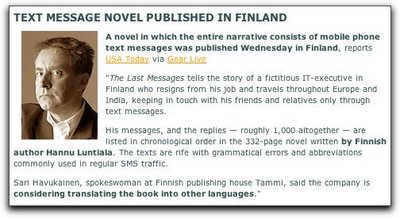In the bgng wz the Wrd?
A matter being debated yesterday (Yes. People are talking about other things, too!) at a T2F table, among a group of teachers, was the spiralling "horror" of the ways in which Internet Messaging and other Social Networking tools were corrupting the English Language, especially in countries where ESL teachers and schools were already struggling hard to impart the rules of good grammar and correct spelling. "The worst is SMS'ing ...", said one one, moaning that "... many students are now writing those crazy expressions like '2 u' for 'to you' in essays." --- "Gawwwd!", groaned another, "I am running out of red ink, circling 'dat' and 'woz' and 'bcz' and '4ever'. Laughter and snorts all around. I joined in the conversation (not uninvited, I assure you) and pointed out that this unnecessary worry about "texting" - a new word, itself, that had one teacher politely trying to cover her wince by altering it into a patronizing smile - has been going on for years. I shared with them a printed copy of an ESN article from 2003, as one example. Many others, too, have debunked this view over the years. I take the stance that this is an evolution in spelling and, while it seems as horrifying to us - just as current spellings would to Chaucer, or the US variants do to people educated under British systems - it poses no threat to the actual purpose of language: Communication. In fact, it furthers it. A piece in The Guardian that opens, with the line, "It's gr8 news for skools", goes on to say:
A study comparing the punctuation and spelling of 11- and 12-year-olds who use mobile phone text messaging with another group of non-texters conducting the same written tests found no significant differences between the two. Both groups made some grammatical and spelling errors, and "text-speak" abbreviations and symbols did not find their way into the written English of youngsters used to texting.And even the conservative TimesOnline informs us that texting teenagers are proving 'more literate than ever before'. Here's an English teacher who uses the text messaging phenomena to advantage in class, while maintaining her view of it as being a bad thing.
While critics of the cellphone revolution say the phenomenon is destroying English, in Mrs Dawson's class, texting is used as a tool for learning Shakespeare, reports the New Zealand Herald. "In her junior classes, the lines taken from Macbeth are transcribed into text language by students, while in other classes, students compose poetry and messages on cellphones. Her innovative use of texting in the classroom may soon spread, as Mrs Dawson has been asked to speak about her novel study unit, which includes composition of a text, at the New Zealand Write Conference in Palmerston North in September. Using texting as a medium in class captured the students' interest and inspired them to do better work, she said. "The counter argument, that literature would lose out if this trend were left to grow is only relevant if what is defined as literature is a narrow band. Even the unconventional punctuation, or the lack of capitalisation, in e. e.cummings's poems still upsets many. A teacher of my acquaintance in the USA was puzzled by the "warped logic" of including of a poem by e.e. cummings in a textbook, saying that it undermined his efforts at setting down writing rules in his class. I wonder what he would think of this, if it made its way into the syllabus.
 Dunno about your reaction, but I would, of course(!), suggest that students be offered the book - provided it is suitable in terms of school policy on content - as 'suggested reading' . I'd then ask to submit 2- line reviews via text messages! Sure would beat that stupid precis writing that we went through ...
E-Learn recently featured an article on the 'Story-Centered Curriculum' by Roger Schank. It was particularly amusing to see the following comment (quoted verbatim from the website). I am sure it would result in a 'conniption' for some members of the ELT group I referred to in the beginning.
(Note: The identity of the commenting teacher has been removed in my blog).
Dunno about your reaction, but I would, of course(!), suggest that students be offered the book - provided it is suitable in terms of school policy on content - as 'suggested reading' . I'd then ask to submit 2- line reviews via text messages! Sure would beat that stupid precis writing that we went through ...
E-Learn recently featured an article on the 'Story-Centered Curriculum' by Roger Schank. It was particularly amusing to see the following comment (quoted verbatim from the website). I am sure it would result in a 'conniption' for some members of the ELT group I referred to in the beginning.
(Note: The identity of the commenting teacher has been removed in my blog).
From: xxx xxx (email) Teacher . xxx . pakistan(Multan) The Story-Centered Curriculum Date: 07/07/2007 03:51:45 i just wanna say tht i have gone through one of the story of your story centered curriculum bcz of ur visit to lahore recently(18th april). i have just read this article n i cd say for sure tht this really works cz as being a teacher i still cd recall all tit bit tht i hve learnt through tht simple story activity...it was fun learning!!!! i hope one day actual learning will occur which will last for long ....I wonder if someone can tell me whether, now that real Urdu texting (not just the Romanized version) is here, what are some of the abbreviations being used.
Labels: Bloggers, Education, Literature, Media, Personal, Technology, Urdu







3 Comments:
I believe that abbreviations of that sort had to be resorted to only when mobile phones of the very primitive sort were in use.
With the advent of a feature called 'Predictive Text Messaging', better known as T9, these have become redundant for many texters, including yours truly.
The following should be of help to those who are yet to start using it:
http://www.pocketpicks.co.uk/latest/index.php/2006/08/17/how-to-make-the-most-of-t9-predictive-text-messaging/
http://mobile.aol.com/mobileaim/t9
Wishing a lot of happy texting to everyone!
:)
11 November, 2007 01:27
OMG. I went to the site. The Multan teacher teaches at one of the 'so-called' better schools. Don't they test the teachers before employing them?
13 November, 2007 00:16
Do read this, too
13 November, 2007 07:55
Post a Comment
<< Home